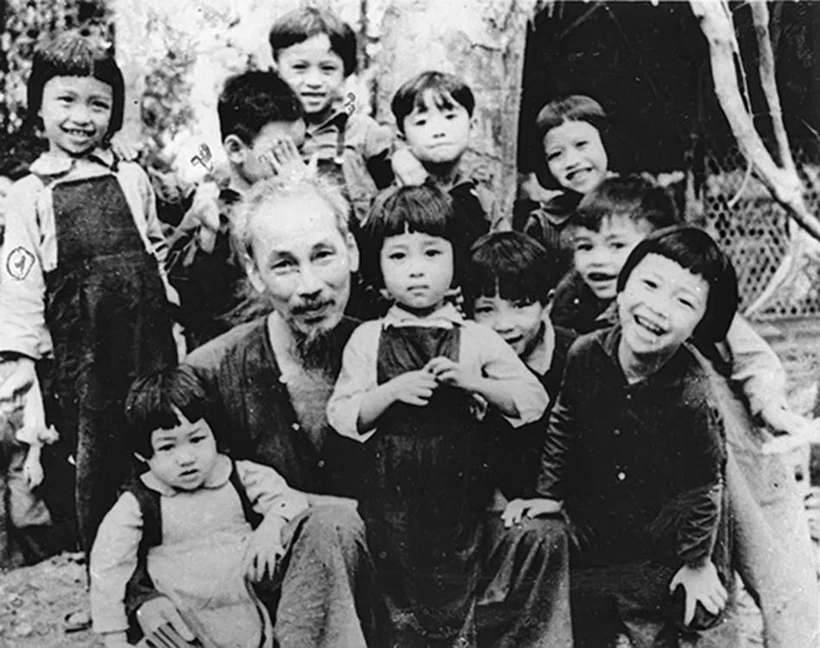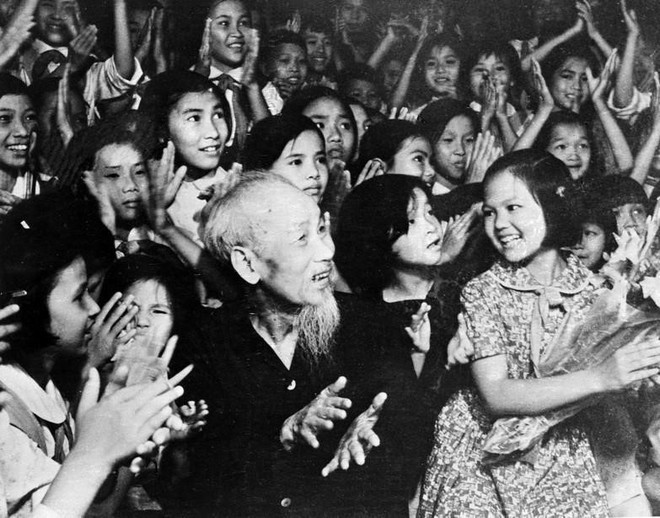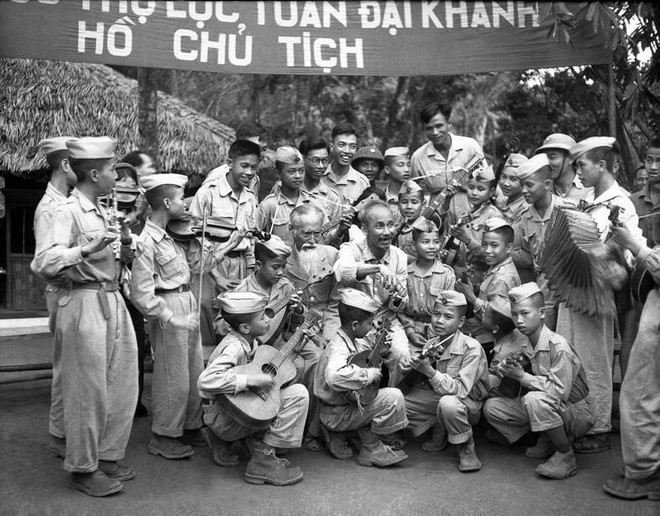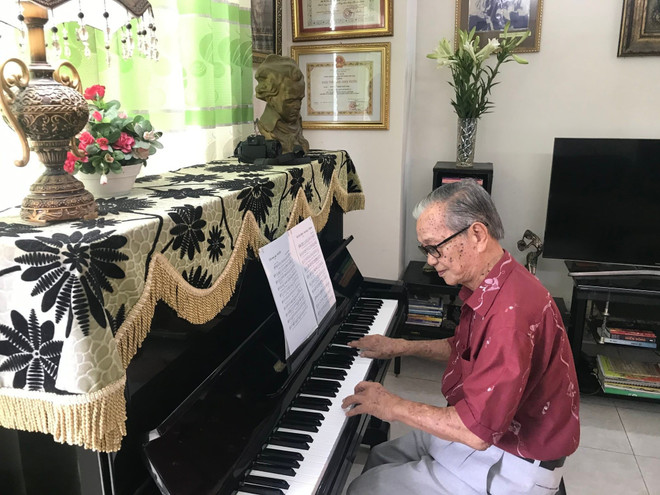
President Ho Chi Minh visits the army’s first boarding kindergarten in the Viet Bac revolutionary base on the occasion of his birthday, May 19, 1953. (File photo: VNA)
Songs composed to express children's love and admiration for President Ho Chi Minh hold a unique place in Vietnam’s cultural and musical heritage. With their gentle melody and heartfelt lyrics, these songs have long transcended music to become lasting symbols of national identity, patriotism, and affection for the late leader.
Many Vietnamese, particularly those from earlier generations, still recall with vivid emotion elicited from the melodies that once echoed through schoolyards and village squares.
For people like Phuong Lan from Lieu Giai ward of Ba Dinh district, Hanoi, such songs evoke strong childhood memories.
She shared that even now, when she hears those songs, she feels a stirring in her heart. Growing up in the 1970s, her youth was closely tied to revolutionary songs, particularly those dedicated to children’s affection for “Uncle Ho” as President Ho Chi Minh is lovingly known.
Among the most enduring titles are "Ai yeu Bac Ho Chi Minh hon thieu nien nhi đong" (Who loves Uncle Ho more than children), “Dem qua em mo gap Bac Ho” (Last night I dreamt of meeting Uncle Ho), and “Tu rung xanh chau ve tham lang Bac” (From the forest, I came to visit Uncle Ho’s mausoleum). These are not just songs but echoes of a time when children strove to behave well and study hard to earn the cherished title “Uncle Ho’s Good Children.”

Uncle Ho and Hanoi children watch musical performances at the Presidential Palace on May 31, 1969 evening, on the occasion of the International Children’s Day (June 1). (File photo: VNA)
Composed in the midst of historical milestones, many of these songs serve as emotional time capsules. The iconic "Ai yeu nhi dong bang Bac Ho Chi Minh" by Phong Nha was created in 1945, inspired by the sight of children cheering as President Ho read the Declaration of Independence at Ba Dinh Square. Touched by the moment when the President warmly waved to the young crowd like a grandfather to his grandchildren, Phong Nha sought to capture this spirit in a song that is simple, loving, and reverent. The resulting lyrics, describing Ho Chi Minh as a tall, gentle man with bright eyes and a long beard, have since been memorised by generations.
President Ho Chi Minh in a photo with a children’s arts troupe from Inter-region 5 and an army children team who visit to offer him the 60th birthday wishes in Viet Bac on May 19, 1950. (File photo: VNA)
Another celebrated composition, "Dem qua em mo gap Bac Ho" was written by Xuan Giao in 1969 shortly after the leader’s passing. Deeply moved by the national mourning and personal memories of meeting the President in 1946 at the age of 15, the composer translated his grief into a touching lullaby-like tune. Its lyrics reflect a child’s dream of meeting the late leader again, singing and dancing joyfully in his presence. For over five decades, the song’s vitality remains intact and it has still been performed at children's programmes and commemorative events.
Equally significant is "Nhu co Bac Ho trong ngay vui dai thang" (As if Uncle Ho were with us on the day of great victory), written by Pham Tuyen on April 28, 1975 night, just before Vietnam’s reunification on April 30, 1975. Composed in merely two hours and recorded on the same day of the national reunification to be broadcast on Radio the Voice of Vietnam, the song captured national elation. With concise yet powerful lyrics, it remains one of the most recognised patriotic songs, often sung at anniversaries and major events.
In 1978, another piece, "Tu rung xanh chau vet tham lang Bac", by brothers Hoang Long and Hoang Lan, continued the emotional narrative. Depicting a child’s journey from a remote village to Hanoi’s Ba Dinh Square to visit Uncle Ho’s Mausoleum, the song’s cheerful rhythm and pure lyrics express the excitement of fulfilling a long-held dream.

President Ho Chi Minh welcomes children at the Presidential Palace on the Mid-Autumn Festival in 1961. (File photo: VNA)
For musician Tran Viet Binh, who sang "Ai yeu Bac Ho Chi Minh hon thieu nien nhi dong" to the President when Binh was a 12-year-old in 1946, the experience left a lifelong impression. Later in life, Binh dedicated himself to children's music, including the award-winning "Chau ngoan Bac Ho" (Uncle Ho’s Good Child), reflecting his enduring inspiration from those formative meetings with the leader.
Many musicians agree that writing songs for children presents unique challenges—it requires not only simplicity but also sincerity. According to Binh, the best compositions manage to weave life lessons and values subtly into joyful melodies that resonate with young minds.

Musician Tran Viet Binh is currently living in Dong Nai province. (Photo courtesy of the musician)
In schools across Vietnam, particularly in May when the nation celebrates President Ho Chi Minh’s birthday, these songs are brought to life anew. Children learn about the President’s five teachings, sing songs in school assemblies, and engage in activities that keep the memory and spirit of Uncle Ho alive.
As Vietnam continues to grow and change, these beloved compositions remain a cultural thread connecting generations. Their enduring popularity serves as both a tribute to the late President and a reminder of the values of love, humility, and patriotism he inspired in the hearts of children./.
VNA
Source: https://en.vietnamplus.vn/childrens-songs-for-president-ho-chi-minh-melodies-that-connect-generations-post321305.vnp
 Vietnam’s fertility plummets, workforce quality concerns mount: national survey
Vietnam’s fertility plummets, workforce quality concerns mount: national survey






